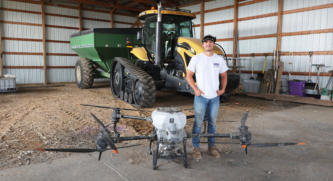“One of the advantages of using a drone is less crop damage,” Wiarda remarks. “It’s also a much more precise application process than an airplane.”
That precision makes it a valuable asset to any farmer. It can also address a variety of needs a farm may have: herbicides for pastures, fertilizers and fungicides for crops, and cover crop seeding. The biggest challenges when it comes to drone spraying are meeting flight regulations and monitoring for optimal spraying conditions, including watching for wind and humidity - but the advantages far outweigh the obstacles.


